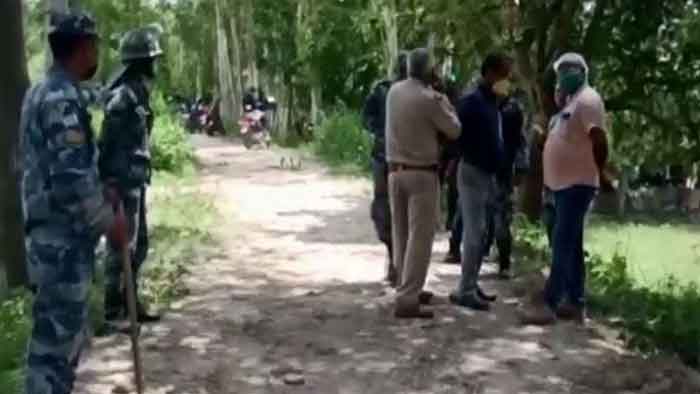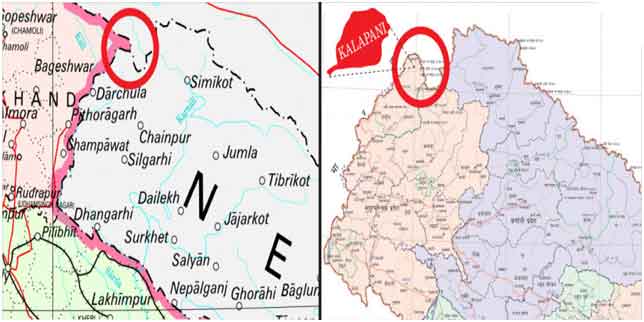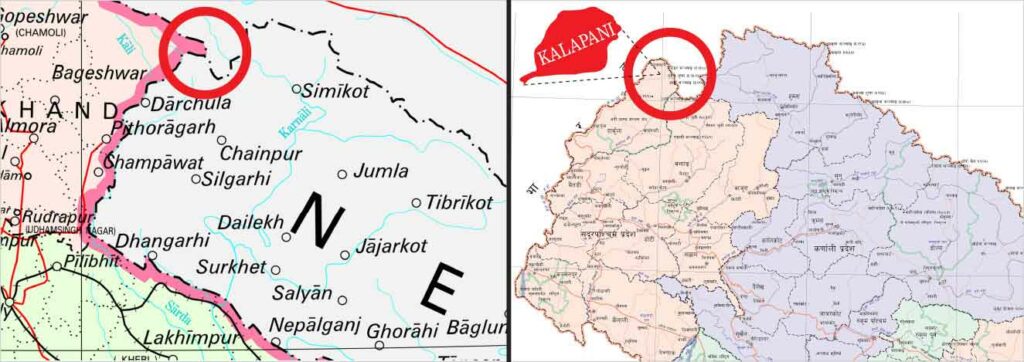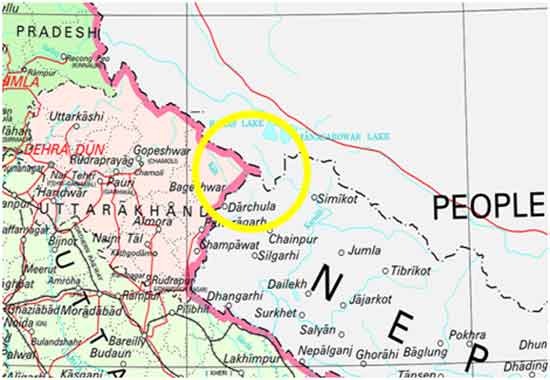This is Part-5 of a series of articles on a crisis in India-Nepal relations. Part-4 was titled India-Nepal Border Dispute : The International Ramifications. It mainly dealt with attempts made in vain to topple a communist regime, the NCP-Oli-led Nepal govt, and the international context and import of the still unfolding controversy.
This one, Part-5, focuses on US hegemonic role in Nepal, as part of its Indo-Pacific strategy aimed at undermining People’s Republic of China. Notably Indo–Pacific is the new nomenclature given to the Asia-Pacific. One can understand how India has been working in tandem with USA.
Part-4 recalled past attempts thus:
The regional hegemon India and its RAW had their own share in such (mis)deeds, experienced by almost all of its neighbors in South Asia, though, one must concede, on a much smaller scale than by US. Modi-led India is emulating its predecessors in these nefarious games. Nepal itself witnessed regime changes at the behests of India, including Modi-led India. A new word, Sikkimization, was added to the political lexicon by India, a word detested and feared by many in Nepal. In 2016, Oli, CPN- UML leader himself blamed Delhi-US collusion for toppling his govt. He was back in power later, with a new alliance with CPN-Maoists, which later merged to form a new party, NCP.
Now again, similar attempts at destabilization of Nepal by the same forces were being made, unsuccessful for the present. This was the context of the Indian media reports about China intervening, successfully, to save Oli-led NCP govt.
Countercurrents.org published a series of articles on the controversy that burst out amid Covid-19 crisis, with many dimensions, national and international.
Part-1 on May24: India-Nepal Border Issue Raked Up, Relations Strained Once Again.
Part 2 on May26: India-Nepal Embittered Relations : Much beyond a Border Dispute.
Part 3 on May29: “Nepal map runs into Parliament wall” : Who built this wall? India! India-Nepal Border Dispute : The International Ramifications.
Part-4 : on June 1 India-Nepal Border Dispute : The International Ramifications.
In Part-4, the following are notable :
India is quietly putting together an anti-Oli coalition, for instance, by brokering the recent merger between the two biggest Madhesi parties, wrote Biswas Baral, the editor of The Annapurna Express, a weekly newspaper of Nepal, May 19…If Oli doesn’t get the (Indian) message, New Delhi could further harden its position vis-à-vis the Oli government.
Part-4 reported how and why Zeenews, May 21, 2020, lamented following the failure of the attempts: “Earlier, New Delhi used to play a crucial role in Nepal politics but now China has emerged as a dominant player in the politics of the Himalayan nation”.
zeenews asserted : Nepal PM KP Sharma Oli raises border dispute with India to repay China for saving his government. (As if, we may add, Nepal had no interest in its own territorial integrity.)
Times of India latest on May 31 reported:
“Despite Modi’s repeated outreach to Nepal, managing ties has been a challenge , the situation becoming more fraught after PM Oli began to turn towards China, even for his own survival.”
The mood in New Delhi is gradually hardening…( it ominously added. Hence we say still unfolding developments.)
In Part-4, it was pointed out: US and India’s concerns can be understood by this significant estimate:
In terms of size, the Nepal Communist Party is the fourth largest in Asia, after China, Vietnam and North Korea in terms of party members. But it is among the strongest governments ever in the history of modern Nepal, with a near two-thirds majority in the federal Parliament, controlling six out of seven provincial governments and 60 percent of the 753 local-level governments.
(This, we may add, notwithstanding all the problems and flaws associated with it.)
New Indian Express, May 2, added China’s envoy in Nepal, (Ms.) Hou Yanqi, expressed hope that the NCP would remain united despite the dispute; took assurance from Prachanda that even if they had to change the PM or the party president, they will not split the party and remain united.
Thus the design, thwarted for the present, for splitting the NCP and toppling or changing the regime was acknowledged. Regime change is a well established practice of the hegemonists, global and regional.
kathmandupost.com reported, May 2, 2020 :
In a series of meetings, Chinese envoy calls for unity among ruling party members.
Hou’s series of meetings preceded a crucial ruling NCP Secretariat meeting on May 2, where apparently attempts to split the party came to an end, at least for the time being.
She was seeking support (of Nepal and NCP) to act as a bulwark against an international movement targeting China.
*** ***
We shall in Part-5 see how US operated in Nepal to achieve its goals, as part of its Indo-Pacific strategy. In fact, these details, given at some length, are useful to understand imperialist manoeuvres elsewhere too.
US says Nepal is part of its Indo-Pacific strategy
That was the title of a report in kathmandupost.com, December 20, 2018 :
United States officials have said Nepal is a part of their ambitious Indo-Pacific strategy, a new strategic initiative undertaken by the Trump administration that focuses on developing opportunities across a range of issues across the broader pan-Asian region.
The announcement was timed with the visit of Foreign Minister Pradeep Gyawali to Washington, where he met with US Secretary of State Michael R Pompeo (See photo below). In a statement released by the State Department on Tuesday, Robert Palladino, the deputy spokesperson, said Nepal’s “central role” in a free, open and prosperous Indo-Pacific among others was discussed during the meeting between the two leaders. They had also discussed Nepal’s $500 million MCC Nepal Compact (MCC-NC).
But Nepali officials downplayed the announcement made by US officials, saying that Nepal had not (yet) taken a decision to participate in the US-led strategy, which is seen by foreign policy experts both in the United States and Asia as a counterbalance to the growing Chinese clout in East and South Asian regions.
These attempts to rope in Nepal have been going on before and after the above at event in USA in December2018:
MCC-NC will be ratified through Parliament despite reservations from some of the ruling party leaders
That is the title of report, one year later, by kathmandupost.com December 20, 2019, even as NCP leaders, including Ministers, were opposing it. That is how States function in parliamentary democracies, the latter being only a rubber stamp of the ruling cliques and the Executive.
The Millennium Challenge Corporation’s Nepal Compact (MCC-NC) will be ratified through Parliament despite reservations from some of the ruling party leaders, according to both government officials and senior leaders within the Nepal Communist Party (NCP).
PM Oli and FM Gyawali were pressing for adoption of MCC.
The ongoing Standing Committee meeting of the ruling party NCP on December 18 Wednesday saw a heated debate over whether the MCC was part of the US Indo-Pacific Strategy.
Majority in the committee urged the government to modify the compact and not to approve it via Parliament if the MCC is the part of the Indo-Pacific Strategy.
That was soon after India published, in November 2019, a new map, post re-organization of Kashmir, that showed Kalapani as part of India. Nepal opposed it, and requested talks, which never took place till now, despite India agreeing to hold talks, including on the border disputes. Thus Nepal was under pressure simultaneously from two powers, US and India. Both share an anti-China strategy. Nepal’s border with China, it should be noted has been managed by India, which controls Nepal’s foreign and defence policies through the India-Nepal Treaty 1950 which treats Nepal as a protectorate state; Nepal has been demanding, for decades, abrogation of that unequal treaty.
“Nepal disapproves of Washington’s Indo-Pacific Strategy”
“Nepal firmly adheres to the non-alignment policy, disapproves of the so-called ‘Indo-Pacific strategy’, opposes any attempt to stop the development of China, and always believes that China’s development is an opportunity for Nepal and is willing to learn from China’s successful experience,” an official statement said.
According to the statement, NCP co-chairman Dahal (Prachanda) told the Chinese foreign minister that Nepal not only verbally, but also firmly adheres to the one-China policy in its actions and will not allow any outside elements to engage in anti-China activities in Nepal.
(kathmandupost.com reported September 11, 2019)
Hours after Chinese State Councillor and Foreign Minister Wang Yi wrapped up his three-day Nepal visit, a series of statements released by Beijing said Kathmandu disapproves of the Indo-Pacific strategy…
In five separate statements released by China’s Ministry of Foreign Affairs on Tuesday, the Chinese government said Nepal has termed the ongoing agitation in Hong Kong as China’s internal affairs and all five key Nepali leaders—President Bidya Devi Bhandari, Prime Minister KP Sharma Oli, Foreign Minister Pradeep Gyawali, Nepali Congress President Sher Bahadur Deuba and NCP Co-chair Pushpa Kamal Dahal—assured Wang that Nepal strictly adheres to one-China policy and will not allow external forces to promote anti-China activities in the country…
According to a statement released by Chinese foreign ministry, Pushpa Kamal Dahal, the ruling communist party co-chairman, who had visited China, disavowed the Washington-led initiative.
*** ***
Carrot and stick : Anti-US forces forced into defensive position
Poor and backward countries like Nepal are sought to be handled by big powers led by US, assisted by its junior partner India, by a policy of carrot and stick :
The MCC, which is a bilateral foreign aid agency of the United States, will provide $500 million in grants to Nepal in support of certain predetermined infrastructure projects once the compact is ratified by Parliament.
Some ruling party leaders have been expressing reservations about the US programme, arguing that the grant is part of the United States’ larger strategy to counter China, Nepal’s northern neighbour, and Beijing’s Belt and Road Initiative.
Leaders opposed to US are also driven into a defensive. The State works its way in a deceptive manner, see how:
The leaders, who have been seen as critical of the government, say they are concerned over the corporation’s ties to the Indo-Pacific Strategy and the potential geopolitical fallout of being part of a strategy, which they widely believe is targeted at countering China.
“We have never said that we should not take US assistance or that we have to damage our relations with the US,” NCP leader Rawal said, according to a copy of the statement seen by the Post. “But our constitution does not allow us to join in any military alliance.”
Rawal has insisted that Nepal needs to first ensure that the MCC is not part of the Indo-Pacific Strategy and make necessary amendments to the compact signed with the MCC before accepting any assistance….
On Wednesday, responding to the Standing Committee’s concerns, Foreign Minister Pradeep Gyawali categorically stated that the MCC was not a part of the Indo-Pacific Strategy since the corporation was formed before the advent of the strategy.
That was even as US asserted it was a part of the Indo-Pacific Strategy, though it claimed it is not directed against anyone, read China.
See how this issue led to a conflict between the ruling party, the NCP, and the Nepal Govt. that was facing the risk of being toppled by dissensions within the party orchestrated with moves by the Opposition parties and groupings. The India-Nepal disputes and the cartographic war, accompanied by nationalistic and ethnic fervour, came to be well-timed with this crisis.
For instance kathmandupost.com December 22, 2019 reported:
US officials though have termed MCC an important initiative under the Washington-led Indo-Pacific Strategy, all of them, including Ambassador Randy Berry, have time and again tried to dispel concerns surrounding the strategy itself, saying it is just a US “policy” and it does not require or demand membership from anyone.
But Communist party leaders continue to see the strategy, and its MCC link, as an attempt to counter China’s Belt and Road Initiative and Beijing’s influence.
( BRI, it may be noted, is a world-wide inclusive project with multi-lateral participation, including several EU powers, not to speak of India’s neighbors in South Asia, that will help counter depression around the world. It is sought to be countered by strategic, military-oriented infrastructure projects of India to encircle China, as part of a larger strategy led by US, including QUAD, and Indo-Pacific strategy. This will help war industry.)
“The foreign minister called on the meeting to help endorse MCC through Parliament, saying there are no serious implications,” said Raghuji Panta, a standing committee member. “But leaders demanded clarity saying many points of the agreement are serious in nature as they contradict the constitution and undermine sovereignty.”
While party Spokesperson Naryan Kaji Shrestha told the Post last week that the MCC compact won’t be held hostage to opposition from some leaders, Minister for Communication and Information Technology Gokul Baskota made it clear that the US programme would be ratified by the Parliament’s winter session, which began on Friday.
The above shows the temerity of pro-US forces despite opposition by the majority in Govt. and the ruling party.
(This controversy haunted the NCP-Oli- led Nepal govt, and was repeatedly discussed in several NCP Secretariat meetings, as per many reports by Nepal’s media, including the same newspaper.)
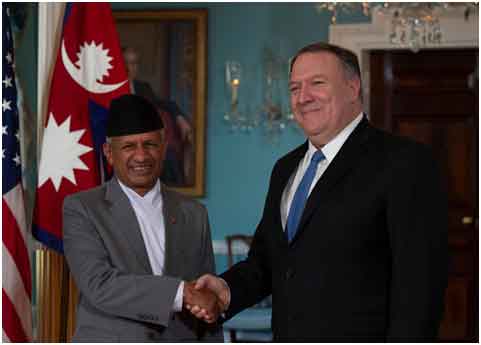
Nepal’s Foreign Minister Pradeep Gyawali met US Secretary of State Michael R Pompeo in Washington, December, 2018. They discussed Nepal’s $500 million MCC Nepal Compact, a part of Indo-Pacific strategy.
“The MCC was announced by US President [George W] Bush in 2002 and since 2008, Nepal has taken initiatives to become a part of it. We finally became eligible in 2011 and we signed an agreement in 2016,” said Gyawali. “The US forwarded the concept of the Indo-Pacific Strategy in 2017.”
Although there has been criticism over the nature of the US programme, ruling party leaders say the opposition won’t block the deal.
This is how so-called bi-partisan support is ensured for and by imperialism. The opposition in Nepal, as we saw in Part-4, has been pro-India, and orchestrated by India. They include various Madhesi factions, and ex-communists who got split for various reasons.
The States indulge in deception. Another report appeared in Nepal’s media, that revealed the reality:
Contrary to government claims, latest Indo-Pacific Strategy report includes Nepal in its State Partnership Program.
*** ***
The Nepal Govt and the ruling party NCP were divided on MCC
The ruling NCP was sharply divided over the MCC’s Nepal compact. A section of the party, led by PM Oli and FM Gyawali, vowed to pass the compact via the Parliament’s December 2019 winter session while another section, led by party co-chair Pushpa Kamal Dahal, has opposed the compact, as it was linked to the Indo-Pacific Strategy of the US.
It was discussed in 9-member NCP Secretariat, and the majority opposed it. So was the Speaker of the parliament, who did not push it, and faced the ire of the PM.
Those who opposed the MCC claimed that the US grant, as part of Washington’s larger Indo-Pacific Strategy, has strong military components aimed at countering China in the region.
The US embassy in Kathmandu on January 17, 2020, issued a 10-point clarification, which it was believed will help the PM. .
“The MCC does not include any military components,” reads the clarification, issued in Nepal. “In fact, US law prohibits the inclusion of military components in any MCC compact.”
The embassy’s clarification should serve as a respite to Prime Minister KP Sharma Oli who has been attempting to pass the MCC Nepal compact via Parliament while convincing naysayers that the grant of $ 500 million is beneficial to Nepal.
The US embassy’s press release does not mention whether the MCC is a part of the Indo-Pacific Strategy. However, several visiting US officials have said that the MCC is definitely a part of the IPS, as is everything that the US does in Nepal or the Indo-Pacific Region. The IPS is not solely a military strategy, they said.
To break the stalemate, the issue was referred to a 3-Member Task Force of the NCP. The details are as follows:
However, NCP secretariat was divided as most of the nine members of the top body stood in favor of endorsing the agreement only after amending ‘some objectionable provisions’ of the MCC grant. So a 3-Member Task Force was formed to study the issue, which on February 22 recommended to the government not to endorse the Millennium Challenge Corporation (MCC) agreement signed between the US and Nepal in its existing form. One Member, the FM was strongly favored passing it.
Arguing that the existing agreement greatly impacts on national sovereignty and the freedom of Nepal and the Nepali people, the committee headed by former prime minister Jhalanath Khanal has recommended to the government not to accept the $500 million US grant without changes to the grant agreement. It has suggested the government revise some ‘objectionable provisions’ of the agreement if it is to be endorsed by parliament.
“MCC [agreement] is not a bible. And it doesn’t mean it is unchangeable,” said the party’s executive chairman Dahal… “When some concerns are raised they should be addressed.” Stating that the agreement was already revised twice, Dahal urged the US to revise the aid agreement to address the issues raised by the Nepali side.
US officials, however, have been refusing to revise the agreement. They have warned of withdrawing the aid if Nepal’s parliament delays to endorse the agreement in the current form.
*** ***
Fishing in troubled waters by Imperialists, led by USA
Fishing in troubled waters – rather they also trouble the waters to fish in them- by imperialists, with the aid of their junior partners, foment never-ending political crises in developing countries. Factionalism in these countries is manipulated by imperialists, who exploit local disputes and conflicting interest groups. They are shown by the self-righteous media as factionalism; it is major part of all news 24X7. Factionalism indeed may be a factor, but clouding issues behind them is the media’s strategy. Fishes and loaves of power, allegations of corruption, are the staple diet of the media.
MCC led to serious differences and a crisis in NCP, in December, 2019.
Despite majority in NCP, and the Task Force opposing the MCC, attempts were made to push the MCC in Budget session this May. Conditions were being discussed to accept MCC, though US rejected any compromises. The old divide continued.
After members demanded a definite answer, party Co-chair Pushpa Kamal Dahal told the meeting that the government would ask the United States to clarify if the MCC compact is part of the Indo-Pacific Strategy, according to a leader.
Bhim Rawal, a standing committee member, said that after leaders expressed serious concerns over a number of issues and provisions of the MCC agreement, Dahal told the party members that Nepal will accept the grant only if the US government formally makes it clear that MCC is not part of the Indo-Pacific Strategy.
The crisis continued unabated. Fishes and loaves of power are in full play to buy over opponents : It was in that context a series of crucial NCP Secretariat meetings took place again recently, on April 29. And Chin made some efforts to keep unity, and the govt.
Chinese Ambassador to Nepal, (Ms.) Hou Yanqi, met NCP leaders Prachanda, Madhav Kumar Nepal, (besides Nepal’s President Bidya Devi Bhandari) at a time when they were determined on ousting PM KP Oli, amid intra-party row.
Oli proposed party Vice President Bam Dev Gautam as the new PM during the party’s Secretariat meeting held.
It was in that context , kathmandupost.com reported, May 2, 2020 :
In a series of meetings, Chinese envoy calls for unity among ruling party members.
According to individuals familiar with the meetings, Hou discussed three primary issues—the ongoing internal crisis in the ruling party, China’s assistance to Nepal to fight Covid-19, and Nepal’s support against the international politicisation of Covid-19 where a number of countries, including the USA , are trying to hold China accountable for the pandemic.
She was seeking support (of Nepal and NCP) to act as a bulwark against an international movement targeting China.
Hou’s series of meetings precede a crucial ruling party Secretariat meeting on May 2.
And New Indian Express, May 2, added she met them again on May 2; expressed hope that the NCP would remain united despite the dispute; took assurance from Prachanda that even if they had to change the PM or the party president, they will not split the party and remain united. Chinese President Xi Jinping also held a telephonic conversation with his Nepali counterpart, Bhandari on April 27. Oli-led government brought two ordinances, to keep himself
The Great Game of Indo-Pacific Strategy
India-Nepal Border Issue was raked up in November 2019 with a new map issued by India, post-Kashmir re-organization, and it goes on unabated, blaming China and leading upto a cartographic war, in the Middle Sector of India-China border. The Eastern Sector (Arunachal) and Western Sector (Ladakh) were once again in the news with a media hype on repeated China’s intrusions, which however were officially denied, by the Indian Army, IAF, and Defence Minister — all of them mentioned differing perceptions of the LAC and the unresolved border problems as the cause.
Within Nepal itself, the new maps issue came to a boil, leading to a political turmoil, a parliamentary stalemate, that threatened to destabilize the NCP and Oli-led Govt of the communists.
All these developments were neither accidental nor co-incidental. They were part of a strategy. India joined with Unot only in in QUAD, but and all along China border, it is building up pressures by various means. The India-Nepal cartographic war has this anti-China dimension.
This can be seen in this less noticed (because of Covid-19 news flood), but significant and candid report of TOI May 5, 2020, titled Why China’s maneuvers in Nepal politics worry India:
China’s strategy in Nepal hinges on an important fact – the unity among the different factions of the Nepal Communist party…
India’s interests remain in the formation of a stronger democratic political front, which should ideally be helmed by the Nepali Congress…they could have gained at the Communists’ expense.
But in the interim, two political parties with a strong presence in the Madhes joined hands — Samajbadi Party and Rashtriya Janata Party, third and fourth largest parties in Parliament merged to form the Janata Samajbadi Party, with (Ex-Maoist) Baburam Bhattarai as a potential leader.
In a sense, it shows a coming together of democratic political forces outside the NC. The Madhes-strong party would have a more positive approach to India. And, it could be the glue for other democratic parties to form a credible opposition to the NCP in future. As a matter of fact, it was this merger that heaped criticism on Oli and made his position tenuous.
Official and political sources in India say they have been following the events in the Himalayan state with concern, as allegations of China micro-managing Nepal’s normally fractious politics abound. But the government does not want to make this a public battle for influence in Nepal for two reasons, largely because all the players of the current political drama have separately reached out to the Indian system, and that India reckons China will be the worse for wear getting in the mud of the never-ending chaos of Nepali domestic politics…
India’s interests remain in the formation of a stronger democratic political front, which should ideally be helmed by the Nepali Congress…the NC is sort of hobbled at the moment when they could have gained at the Communists’ expense.
But in the interim, two political parties with a strong presence in the Madhes joined hands — Samajbadi Party and Rashtriya Janata Party, third and fourth largest parties in Parliament merged to form the Janata Samajbadi Party, with (ex-Maoist) Baburam Bhattarai as a potential leader.
In a sense, it shows a coming together of democratic political forces outside the NC.
The Madhes-strong party would have a more positive approach to India.
And, it could be the glue for other democratic parties to form a credible opposition to the NCP in future.
As a matter of fact, it was this merger that heaped criticism on Oli and made his position tenuous.
Thus, a full screen play was written about a possible regime change in Nepal. All this was going on in tandem with US moves to wean away Nepal from China, by arm-twisting and carrot and stick policies.
But all these efforts by hegemonists, US and India are thwarted, at least for the present, by Nepal. And this is painted as China’s interference in Nepal!
SIGN UP FOR COUNTERCURRENTS DAILY NEWS LETTER

